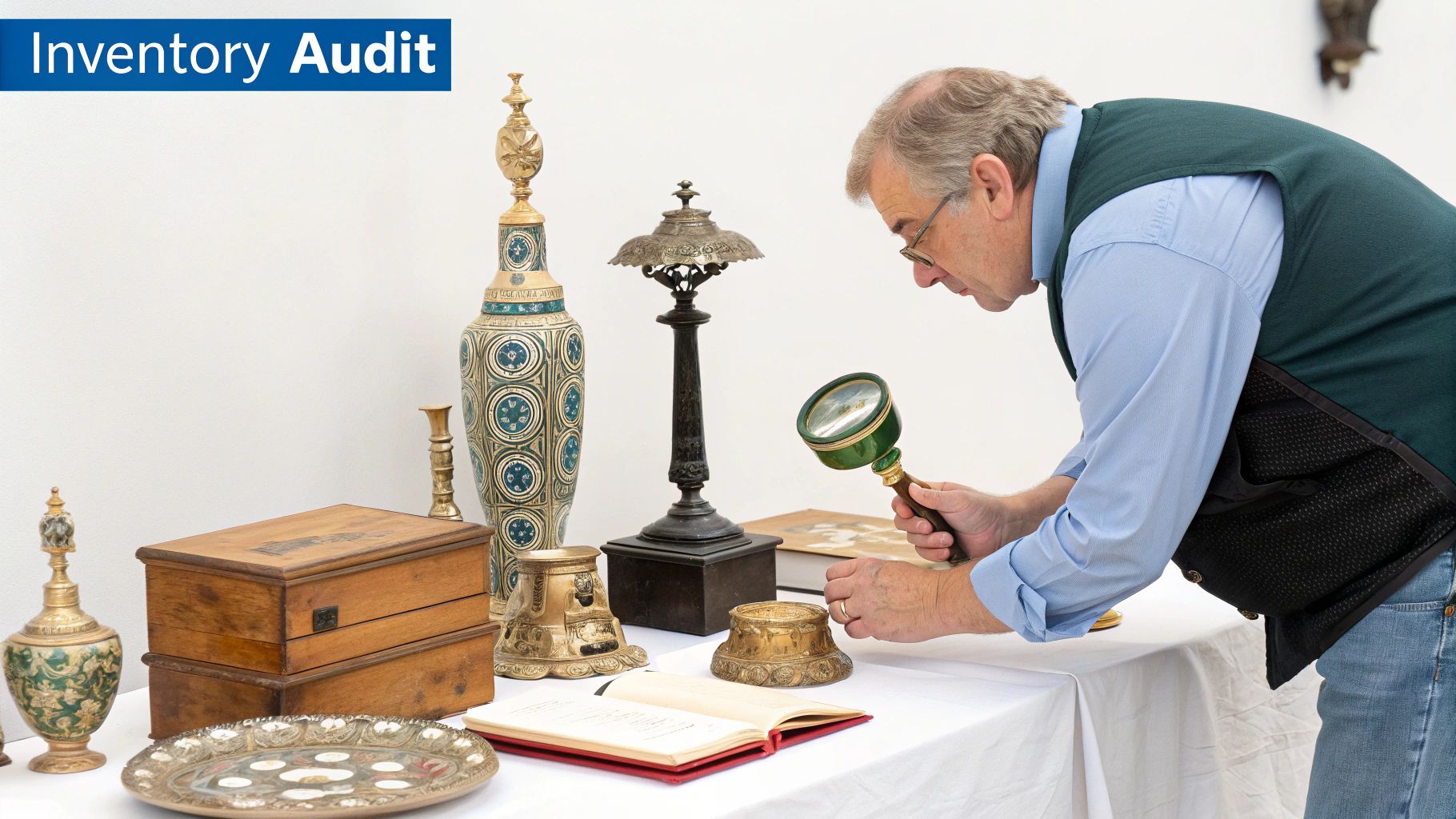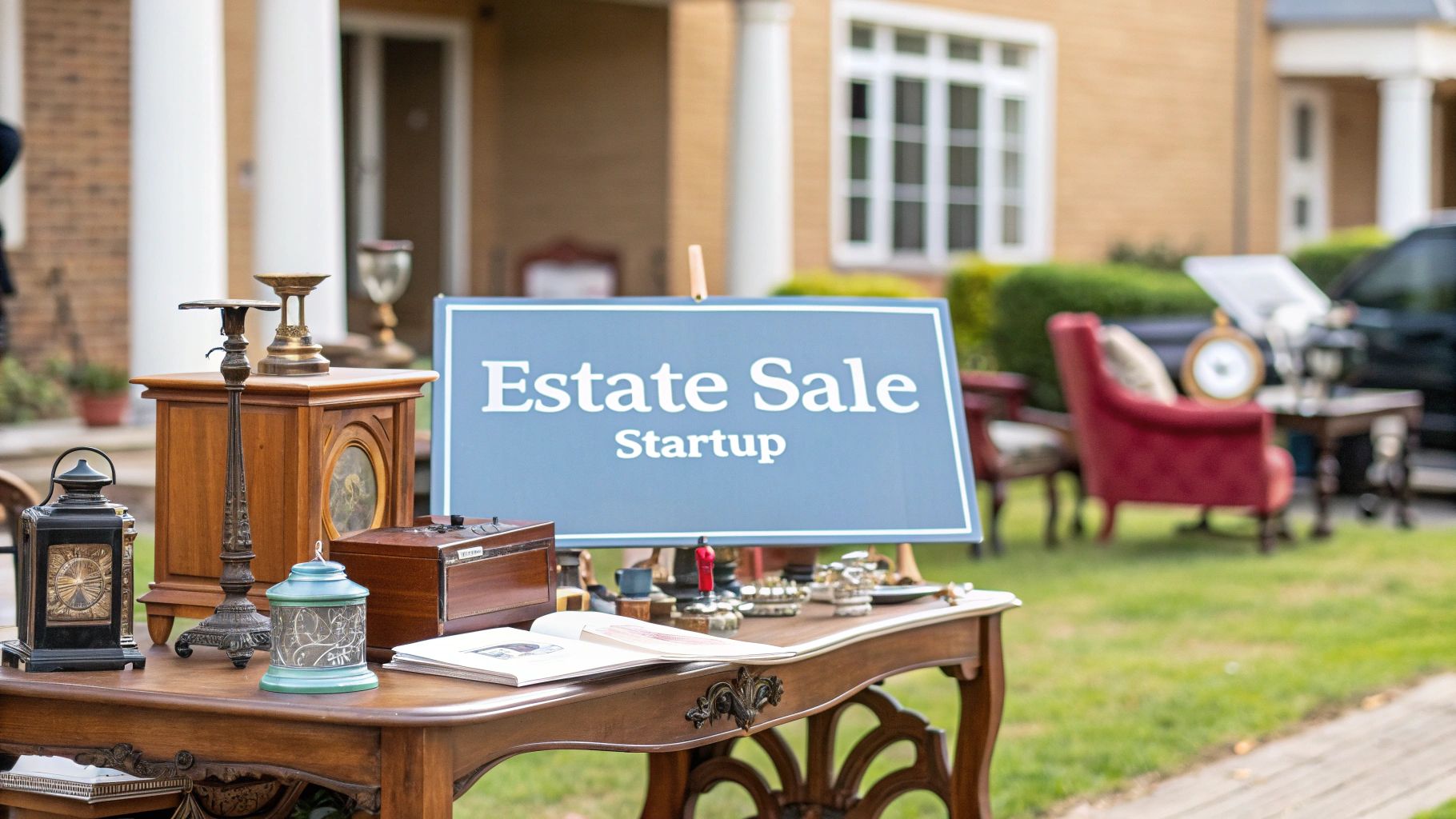Starting an estate sale business isn't something you just jump into. It unfolds in stages, beginning with a rock-solid plan. You'll need to sort out the legal and financial side, get good at pricing and staging, market yourself effectively, and finally, run a flawless sale. Think of this first part as drawing the map—it’s what will guide you and keep you from getting lost.
Getting Started in the Estate Sale World
Before you even think about signing your first client, you need a reality check on what this business is all about. Being successful here isn't just about selling old stuff. It's a career built on a foundation of trust, empathy, and some very specific knowledge. This is a service business at its core, demanding a rare mix of compassion and sharp business sense.
Let's be clear: you'll be meeting people during some of the toughest times of their lives. They might be downsizing in their later years, dealing with a mountain of debt, or grieving the loss of a loved one. Your ability to navigate these conversations with grace and professionalism is absolutely critical.
Finding Your Place in the Market
The estate sale business is surprisingly resilient. Because the need is tied to major life events, it doesn't get hit by economic slumps the way many other industries do. The numbers back this up. As of 2024, the estate liquidation market in the U.S. has grown into a $230.3 million industry with close to 800 businesses. This steady growth shows a real, consistent demand for what you'll offer. For a deeper dive into the numbers, IBISWorld offers a detailed report on the estate liquidation market.
Your job is so much more than being a salesperson. You’re essentially a project manager for someone's personal history, tasked with sorting, valuing, and selling an entire lifetime of belongings.
This means you need a pretty diverse skill set:
- A Good Eye for Value: You have to be able to spot value in everything from antique dressers and costume jewelry to everyday kitchen gadgets. You won't be a certified appraiser for every single item, but you absolutely must know when it’s time to bring in an expert.
- Serious Organizational Skills: Imagine turning a home packed with decades of stuff into a clean, inviting, and shoppable space. It's a huge undertaking, both physically and mentally. Good systems are the only way to stay sane and maximize what the sale brings in.
- A High EQ (Emotional Intelligence): Your clients are going through a lot. They aren't just another transaction. The ability to genuinely listen, show you care, and build a strong rapport is just as vital as knowing how to price a silver tea set.
My Two Cents: The folks who really make it in this business are the ones who master the "soft skills" of handling clients just as well as the "hard skills" of pricing and selling. A reputation for being compassionate will bring you more word-of-mouth referrals than any ad ever will.
What Does an Estate Sale Operator Actually Do?
When you’re just starting out, you wear all the hats. You’re the CEO, marketer, appraiser, stager, and cashier, all in one. A typical job isn’t just one task; it’s a whole series of hands-on steps that make up your service.
Here's a look at what a project usually involves:
- The Initial Consultation: This is where you meet with potential clients, get a feel for the estate, and walk them through your process.
- The Big Sort: You'll go through everything in the house, separating treasures from trash and items that can be donated. This is often a discovery process.
- Research and Pricing: This part takes real diligence. You'll be researching items online and in books to determine their fair market value.
- Staging the Home: You're not just putting out price tags. You're arranging the home to look like a boutique, creating a safe and appealing flow for shoppers.
- Getting the Word Out: Taking great photos of the best items and promoting the sale is key to drawing a big crowd.
- Running the Sale: This is game time. You'll be managing your team, handling all the transactions, and keeping an eye on the crowd.
- Wrapping Things Up: After the sale, you'll need to manage any leftover items and provide your client with a clear, detailed breakdown of the finances.
Making Your Business Official and Protected

Alright, you've decided to take the plunge. Now comes the part that can feel a little intimidating: turning your idea into a legitimate, protected business. It’s easy to get bogged down in the legal and financial jargon, but trust me, getting this stuff right from the very beginning will save you from a world of headaches later on. This isn't just about shuffling papers; it’s about building a solid professional foundation that protects your personal assets and shows clients you’re serious.
The estate sale world isn't just a side-hustle anymore. The 2023 Estate Sale Industry Survey revealed that 60% of estate sale businesses now consider their operation their main source of income. That's a huge leap from just 49% back in 2021. This trend makes it crystal clear: you have to treat this like a real business from day one if you want to succeed.
Choosing Your Business Structure
One of your first major decisions is how to legally structure your company. For most people starting out in this field, it boils down to two main choices: a Sole Proprietorship or a Limited Liability Company (LLC).
Sole Proprietorship: This is the absolute simplest and cheapest way to get started. You and your business are one and the same in the eyes of the law. While that's easy, it also means you have zero personal liability protection. If a shopper trips and falls at a sale, or a client sues over a damaged antique, your personal assets—your house, your car, your savings—could all be on the line.
Limited Liability Company (LLC): An LLC acts as a legal "wall" between your personal life and your business. It shields your personal assets from business debts and lawsuits. Yes, it requires a bit more paperwork and a registration fee, but that protection is priceless in a business where you're constantly working in other people's homes and handling their valuable possessions.
Frankly, for anyone who plans to do this professionally, forming an LLC is the only way to go. The peace of mind alone is worth the small upfront cost and effort.
Getting Your Paperwork in Order
Once you've picked a structure, it's time to file the paperwork. This is what makes your business official to the government and, just as importantly, to your potential clients.
First, you'll need to register your business name. If you're going to operate under a cool name like "Maple City Estate Sales" instead of just your own name, you'll probably need to file for a "Doing Business As" (DBA) name.
Next up is getting an Employer Identification Number (EIN) from the IRS. It's essentially a Social Security number for your business. It's completely free to get online, and you absolutely need one to open a business bank account, file taxes, or hire any help.
Key Takeaway: Don't even think about skipping the EIN. It creates a clean separation between your business and personal finances, which is critical for clean books and maintaining your legal liability shield.
Finally, you need to check with your local city and county clerk about business licenses and permits. These requirements can vary wildly from one town to the next. Some places might just require a general business license, while others have specific permits for holding sales in residential neighborhoods. To get a better handle on the specifics, our guide on understanding estate sale laws is a great resource.
Protecting Your Business and Finances
With your legal setup handled, the last two pieces of the puzzle are insurance and banking. These are non-negotiable.
Business insurance is your safety net. At a minimum, you'll need General Liability insurance. This covers you if someone gets hurt at one of your sales or if you accidentally damage the client's property. Bonding is another smart move; it protects your clients from any potential theft by you or your team. Having both tells clients you’re a trustworthy professional they can count on.
Last but not least, open a separate business bank account the moment you have your EIN. Never, ever mix your personal and business funds. A dedicated account makes bookkeeping a thousand times easier, simplifies tax time, and reinforces that legal separation you created with your LLC.
Disclaimer: The information provided here is for educational purposes only and is not a substitute for professional legal or financial advice. Always consult with a qualified attorney and accountant to understand the best options for your specific situation.
Designing Your Services and Pricing for Profitability

Let's talk about the engine of your business: how you'll actually make money. The way you structure your services and fees defines your value to clients and ultimately determines whether your business thrives. Remember, you're not just selling stuff. You're providing a comprehensive project management service, and your pricing has to reflect that level of expertise.
The industry standard is a straight commission on the total gross sales. This usually lands somewhere between 30% and 50%, depending on your local market, your experience, and the complexity of the sale. Clients like this model because it’s easy to grasp, and it ties your success directly to theirs. The better you do, the better everyone does.
Commission Structures in Practice
A simple flat percentage works, but it isn't always the smartest approach. Think about it: a modest two-bedroom home filled with everyday items is a very different project than a sprawling estate packed with rare antiques and collectibles. A one-size-fits-all commission doesn't really reward the extra research, staging, and marketing that a high-value sale demands.
This is where tiered commission structures can really shine. A tiered model is designed to motivate you to hit higher sales goals by adjusting your percentage as the total grows.
Here’s what a tiered structure might look like in the real world:
- 35% on the first $15,000 in sales
- 30% on sales from $15,001 to $50,000
- 25% on anything over $50,001
This strategy shows clients you're driven to get them the best possible outcome, while also making sure you're fairly paid for the work. It’s a win-win that can give you a serious edge over competitors stuck on a single flat rate.
A Note on Pricing Items: Of course, your commission doesn't mean a thing if the items aren't priced to move. Learning the art of valuation is a skill honed over time with lots of research. For a deeper dive, check out our guide on how to price estate sale items to make sure you're maximizing value for your clients.
Expanding Your Service Offerings
A smart estate sale business looks for revenue streams beyond just the sale itself. By offering add-on services, you not only increase your income but also give your clients a more complete, less stressful experience.
Think about adding these to your menu:
- Full Clean-Out Service: Once the sale is over, clients are often faced with what's left. You can offer to handle it all—managing donations, scheduling junk removal, and leaving the house broom-clean for a flat fee or hourly rate.
- Buy-Out Option: For the items that remain, you could offer to buy the lot for a lump sum. This gives the client a clean, fast conclusion and leaves you with inventory you can sell through other channels, like an online shop or a booth at an antique mall.
- Specialty Consignment: Got your hands on a rare piece of art or a valuable coin collection? These might not fetch top dollar at a typical estate sale. Offer to manage their sale on consignment through a specialized auction house for an added fee.
The Importance of a Rock-Solid Contract
Your contract is your best friend in this business. It's the foundation of your professional relationship with a client, spelling out every detail to prevent confusion and build your reputation for being transparent and trustworthy. A clear, thorough contract protects everyone involved.
Your agreement needs to lay out the scope of work and every financial detail. This is where you put your commission structure in writing, list any extra fees (like advertising or clean-out charges), and clarify your payment timeline. It should also be crystal clear about what happens to unsold items—donation, buyout, or disposal.
Disclaimer: The information in this section is for educational purposes only. Always have a qualified attorney review your client contracts and business agreements to ensure they are legally sound and compliant with local regulations.
Mastering the Art of Sale Preparation

The real work of an estate sale professional happens long before the doors open on day one. This is where you really earn your commission—transforming a private home, often packed with a lifetime of memories, into an organized and profitable pop-up shop. It's a job that requires equal parts empathy, grit, and a sharp eye for value.
Your process kicks off the second you walk through the door for that first client meeting. Think of this as more than a quick look-around; it’s a strategic deep dive. You're not just scanning the furniture; you're assessing the home's layout, identifying potential bottlenecks, and getting a feel for the project's true scope.
The Initial Walkthrough and Assessment
During this first visit, your main job is to listen. A family is placing a great deal of trust in you, and asking the right questions is the fastest way to build confidence. Don't just ask, "What's for sale?" That's a rookie move.
Go deeper with questions that uncover the project's logistics and potential curveballs:
- Are there any specific heirlooms or items the family plans to keep?
- Do we have a hard deadline, like a looming real estate closing?
- Do you know of anything particularly valuable, like fine jewelry, artwork, or a specific collection?
- Are there any off-limits areas, like a packed-to-the-gills attic or a locked shed we need to access?
The answers you get here will be the building blocks for your entire plan and help you set realistic expectations from the get-go.
The Art of Sorting and Researching
Once you get the go-ahead, the real hands-on work begins. Sorting is a methodical process of discovery. You're diving in and creating three distinct piles: sell, donate, and discard. This is often the most physically and emotionally taxing part of the job, but it’s also where you'll find the hidden gems that can make or break a sale.
As you sort, the critical task of research and pricing starts. You don't need to research every single coffee mug, but you do need to develop an instinct for when to hit the pause button and investigate further. I keep tools like Google Lens and various online auction sites bookmarked for quick checks on everything from vintage Pyrex to obscure tools. For a deeper dive, our guide on how to organize an estate sale offers more specific strategies for this phase.
A huge mistake I see new operators make is pricing based on emotion or what something cost 30 years ago. Your prices have to reflect today's secondary market value. If they don't, your items won't sell. Period.
Knowing When to Call a Specialist
Look, you're not going to be an expert on everything. In fact, knowing your limits is a sign of a true professional. For certain high-value or niche items, your best move is to bring in a certified appraiser.
This is non-negotiable for categories like:
- Fine Art and Sculptures: An art specialist can tell a priceless original from a pretty print.
- Jewelry and Gemstones: You need a gemologist to accurately grade stones and assess precious metals.
- Rare Coins and Stamps: A numismatist or philatelist has the deep knowledge required to spot valuable rarities.
- Antiquarian Books: A specialist can properly value first editions and rare manuscripts.
Working with an appraiser doesn't just get a better price for your client; it protects your reputation and credibility.
Staging for Maximum Shopper Engagement
Finally, it's time to stage the home. This is so much more than slapping price tags on items. You’re creating a temporary retail experience designed to get people to browse longer and buy more. A well-staged sale should feel clean, bright, and easy to navigate.
Group like items together to create mini "departments"—all the kitchen stuff in the kitchen, all the tools in the garage. Use tables with clean tablecloths to bring smaller items up to eye level. Most importantly, ensure you have wide, clear paths for shoppers to move through the house without bumping into each other. Good staging has a direct and immediate impact on your final sales numbers.
Disclaimer: The information in this section is for educational purposes only. When dealing with high-value items, always consult with certified appraisers to ensure accurate valuation and protect your client's interests.
Winning Clients and Attracting Eager Shoppers

An estate sale business really has two engines. You need a constant flow of clients who trust you with their homes, but you also need crowds of shoppers eager to buy what's inside. Getting good at marketing to both groups is the secret sauce to building a business that lasts.
Think of your professional website as your digital handshake, but the real work of landing clients happens by building relationships in your local community. Those connections will become your single best source of new business.
Building Your Professional Referral Network
Word-of-mouth is everything in this business. You can give it a strategic nudge by connecting with other professionals who meet people in your exact target market.
- Probate and Family Law Attorneys: These folks are on the front lines, helping families settle estates. They're an incredible source of high-quality referrals.
- Real Estate Agents: Realtors constantly have clients who are downsizing or need to clear a home before listing it. You're their perfect partner.
- Senior Living Coordinators: When seniors transition to assisted living, they almost always need to downsize significantly. Coordinators are your direct line to these clients.
A cold email might get you on their radar, but nothing beats a face-to-face meeting over coffee. Show up with a professional brochure and some business cards, ready to clearly explain how your process makes their job easier.
Expert Insight: Don't just sell your services; sell a solution. To a realtor, you're the pro who gets a house market-ready, fast. To an attorney, you’re the trusted expert who can responsibly liquidate assets to help settle an estate.
Attracting Shoppers and Creating a Buzz
Once you book a sale, the game changes. Now, you need to get buyers in the door. Nothing makes a client happier—or a sale more profitable—than a line down the block on opening day.
Your best bet for this is listing the sale on a dedicated platform. A site like EstateSales.net is the go-to for serious shoppers. It lets you post detailed descriptions and, most importantly, lots of photos that pull in buyers from across the region.
You should also be building your own email list at every single sale. Have a simple sign-up sheet at the checkout table. Sending a newsletter a few days before your next event is a powerful way to bring back loyal, repeat customers.
Marketing an estate sale business requires a two-pronged approach. You have distinct strategies for finding clients versus bringing in shoppers. This table breaks down where to focus your efforts for each audience.
Marketing Channels for Your Estate Sale Business
| Marketing Channel | Primary Target | Key Strategies | Potential ROI |
|---|---|---|---|
| Professional Networking | Clients (Realtors, Attorneys) | In-person meetings, sharing brochures, positioning yourself as a problem-solver. | High. Builds a long-term, reliable referral pipeline. |
| Your Website & SEO | Clients | Professional design, client testimonials, clear service descriptions, local SEO. | Medium to High. Establishes credibility and captures organic search traffic. |
| Estate Sale Listing Sites | Shoppers | High-quality photos, detailed descriptions, clear logistics (hours, address). | Very High. Reaches a large, targeted audience of active buyers. |
| Email Marketing | Shoppers | Build a list at sales, send pre-sale newsletters with photo highlights. | High. Creates a loyal following of repeat customers for minimal cost. |
| Social Media | Shoppers | Post teaser photos/videos of top items, share sale details, run targeted ads. | Medium. Good for building buzz and reaching a local audience. |
| Local Signage | Shoppers | Professional, clear, and well-placed signs on sale days. | High. Crucial for directing day-of traffic to the sale location. |
Ultimately, a balanced marketing plan that nurtures referral partnerships while consistently promoting sales to the public will give you the best chance for sustainable growth.
Crafting Compelling Sale Listings
A great sale listing is more than an announcement. It tells a story and creates a little "fear of missing out" (FOMO). This is where you really sell the sale before it even begins.
High-Quality Photography is a Must
Your photos are your #1 marketing tool. Period. They need to be bright, clear, and in focus. Don't just snap wide shots of messy rooms. You need to create little visual stories.
- Stage interesting items against a simple, clean background.
- Group collections together to show their scale and appeal.
- Get close-ups of brand names, signatures, and unique details.
Write Descriptions That Actually Sell
Your words should highlight the treasures. Mention specific brands, styles, and categories that you know collectors and niche buyers look for.
Instead of writing, "lots of old stuff," try this: "Packed sale featuring a collection of mid-century modern furniture, vintage Pyrex, and a garage full of well-maintained Craftsman tools." That specific language is like a magnet for the right buyers.
Running the Sale and Wrapping Up Like a Pro
Sale days are pure, controlled chaos. This is your showtime, where all that behind-the-scenes work—the sorting, the pricing, the staging—finally pays off. You can't be everywhere at once, so your team is your biggest asset. For a standard three-bedroom house, I’ve found that a team of three is the magic number. You'll want one person anchored at the checkout and two others "floating" on the floor. Their job is to help customers, answer questions, and most importantly, keep an eye on things.
Your checkout station is the sale's nerve center. It has to be efficient and easy to find. I always set mine up right near the main exit. This creates a natural traffic flow and helps you monitor who's coming and going. Stock it with everything you could possibly need: a cash box loaded with change, a credit card reader like Square, plenty of bags, and wrapping paper for delicate purchases.
Handling Haggling and Keeping Things Safe
Let's be real: haggling is part of the fun for most shoppers. You just need a game plan. Decide on your discount structure before you open the doors. A common strategy that works well is full price on day one, 25% off on day two, and 50% off on the final day. This gives your staff clear rules to follow so they aren't constantly asking you for approval.
Nothing is more important than safety. You absolutely have to manage how many people are in the home at one time. During the initial rush, a simple "one-in, one-out" policy at the door is a lifesaver. It prevents dangerous overcrowding and protects the client's property. Also, make sure to use brightly colored tape or signs to block off any no-go zones or hazards like a steep basement staircase.
My Two Cents: Your final conversation with the client is just as important as your first one. A messy wrap-up can ruin an otherwise perfect sale and kill your chances for a referral. A professional finish is what people remember.
The Post-Sale Cleanout and Payout
The doors are closed, but your work isn't done. The post-sale process is where you truly earn your five-star reputation. Your contract should have already spelled out what happens to everything that's left over. Now, it's time to make it happen.
This usually breaks down into a few distinct phases:
- Triage the Leftovers: You’ll sort the remaining items based on what you agreed to with the client. This could mean boxing things up for donation, separating items for a buyout company, or prepping for a complete property clean-out.
- Handle the Logistics: Get on the phone and schedule the donation truck pickup or the junk removal service if that’s part of your package.
- Tally the Numbers: This is the most crucial part of the wrap-up. Meticulously count every dollar and reconcile all sales receipts. Check your math, then check it again.
The last thing you hand your client is a crystal-clear settlement sheet. This document needs to be simple and transparent, showing the total gross sales, your commission, any expenses they approved (like advertising fees), and the final net amount they'll receive. Getting them that check quickly, along with this detailed breakdown, is the final handshake. It cements their trust in you and is the single best way to grow your business through word-of-mouth.
Disclaimer: The financial and contractual information discussed is for educational purposes. Always consult with a qualified attorney and accountant to create legally sound client agreements and manage your business finances.
Getting Past the "What Ifs": Your Top Questions Answered
Jumping into the estate sale world naturally comes with a lot of questions. I've been there. Let's tackle some of the most common concerns I hear from people just starting out.
What's the Real Earning Potential?
Let's talk numbers. Your income is a direct result of your commission rate—which usually lands somewhere between 30% and 50%—plus the value of the homes you liquidate and how many sales you can manage.
When you're new, you might be handling smaller, more modest estates. But as you build your reputation, you can start landing higher-value projects and even run multiple sales at once. The real key to profitability, though, is keeping a tight rein on your biggest expenses: insurance, marketing, and paying your team.
What's the Toughest Part of Getting Started?
Honestly, the biggest hurdle at the beginning is just getting your name out there. Finding those first few clients feels like a mountain to climb, and it all comes down to building a solid referral network. You have to consistently connect with people like real estate agents, elder law attorneys, and probate lawyers who can send business your way.
Right behind that is the challenge of pricing. Walking into a house filled with a lifetime of stuff and putting a price on everything is daunting. That confidence only comes with time, research, and hands-on experience.
Do I Need an Appraiser Certification?
Nope, you don't need to be a certified appraiser to run a successful estate sale company. Your job is to get good at researching and pricing everyday household items, from furniture to kitchenware.
The most important skill is knowing what you don't know.
Build a list of trusted, certified appraisers you can call on for the big-ticket stuff—fine art, antique jewelry, rare coins, first-edition books. This protects you, builds trust, and ensures you're getting the best possible value for your client. It's a win-win.
Ready to master item identification and valuation? Curio is the essential tool for new and experienced estate sale professionals. Instantly get history, context, and estimated values for antiques and collectibles with just a photo. Download Curio today and appraise with confidence.
